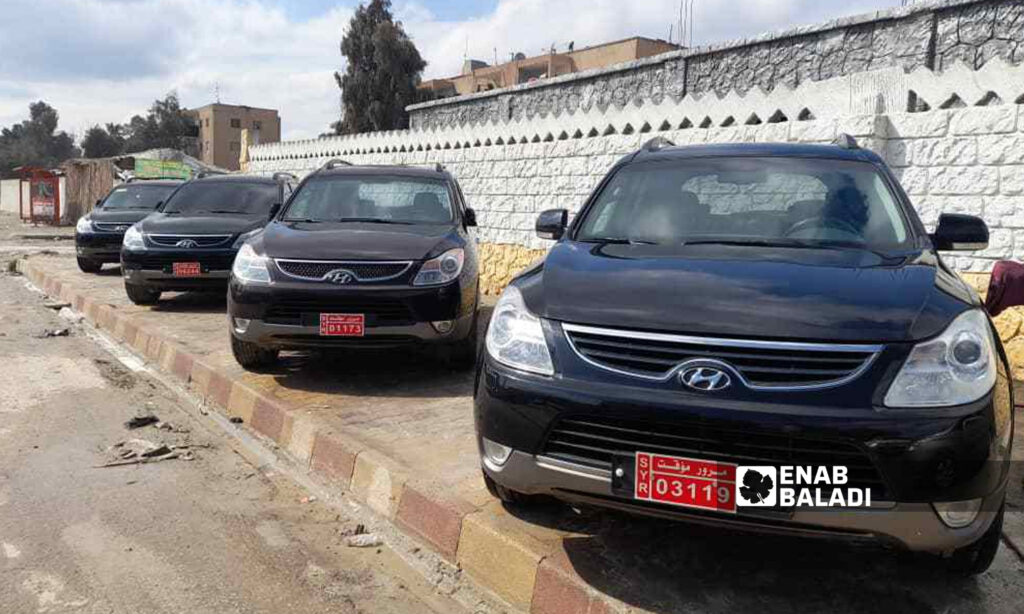Raqqa – Hussam al-Omar
Muhannad al-Katea, 45, is no longer interested in selling cars with Syrian license plates in his showroom on the outskirts of the northern city of Raqqa.
Now, he prefers to buy and sell the used, newly-manufactured cars with a temporary entry license.
Al-Katea told Enab Baladi that he had failed to sell any of the Syrian-registered cars, but during the same period, he sold many EU-imported cars.
When you want to sell a car with a Syrian license plate, you have to check its registry papers, know the main owner and the possibility of transferring ownership, and all these things hinder the work of car dealers, he said.
The used cars are imported from Turkey to Raqqa through Idlib region, which is under the control of Hayat Tahrir al-Sham (HTS), or through Aleppo countryside, which is controlled by the Turkish-backed Syrian National Army (SNA), or through the Iraqi Kurdistan to areas of the Autonomous Administration of North and East Syria (AANES).
The car market in Raqqa contains dozens of showrooms on the northern outskirts of the city on the road linking al-Sawame’ roundabout and al-Furusiyah roundabout along the railway, which is officially known as the Andalusian neighborhood, in addition to some scattered offices within the city’s neighborhoods and villages in the countryside.
Replacing old cars with new European ones
Residents of Raqqa and other areas under the control of the Autonomous Administration tend to sell their old cars, which have the regime’s license plates, to buy European cars which have a temporary entry license.
Wael al-Hamid, 38, sold his 2001 Kia Rio car for 7,000 US dollars, which is registered in the regime’s transportation departments, to buy a 2007 Japanese Mazda Zoom car with a temporary entry license for 4,500 US dollars.
Residents prefer to buy EU-imported cars for several reasons, foremost among which is the recent manufacture of these cars compared to previously regime-registered cars, in addition to the lower price of “entry license” cars than other cars, according to al-Hamid,
The decline in the number of regime-registered cars in the northeast is due to car dealers buying and transporting them to regime-controlled areas and selling them there due to their high prices compared to areas in northeastern Syria.
A number of car dealers told Enab Baladi that they prefer to sell Syrian-registered cars in regime-controlled areas because they are more in demand, and even individuals prefer selling their cars bearing the regime’s government papers to take advantage of the price difference and buy cars with newer specifications at a lower price.
In early December 2021, the Autonomous Administration banned the entry of “European tourist cars,” which were manufactured before 2012.
The prices of European cars have also fallen during the past months by about 20 percent due to the increase in the number of cars entering the region’s markets, car dealers told Enab Baladi.
The customs duties in the Autonomous Administration for European cars with temporary entry licenses range between 1200 and 1600 US dollars when the car is registered for the first time in the traffic and transportation departments.
Vehicle registration fees in the areas under the control of the Autonomous Administration have increased by 100 percent since the beginning of 2021.
In a previous interview with Enab Baladi, one of the traffic administrators in Raqqa said that the entry of cars into northeastern Syria carries with it several consequences, including an increase in the demand for fuel, an increase in overcrowding in the main cities, in addition to the freezing of funds for the price of these cars.
Most EU countries ban old cars for reasons related to the environment and environmental pollution, and the cost of parts for the expensive cars needed by those cars has a drain on resources.

